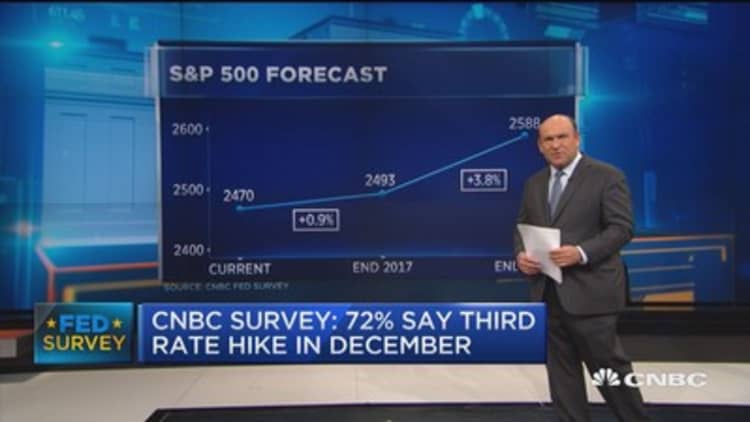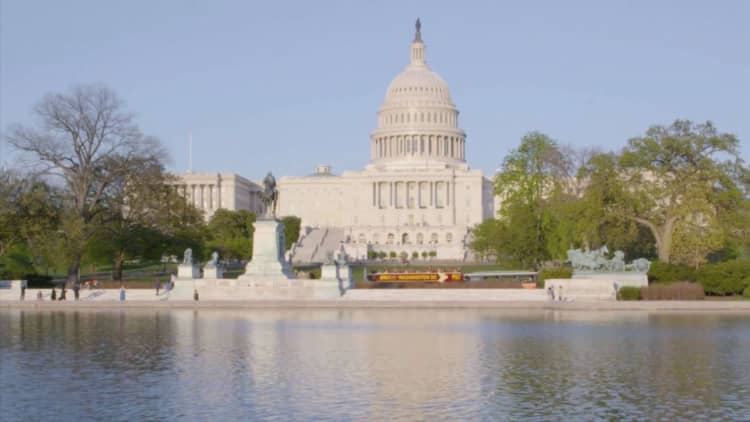
The Trump trade is turning into the Trump fade even as stock market indexes continue to climb to new highs.
Investors have backed away from some of the key sectors that would seemed to have benefited from President Donald Trump's aggressive pro-business agenda. Flows to exchange-traded funds now show market players looking for more dependable growth sectors than the reflation areas that dominated the earlier part of the year.
"Immediately after the election it seemed like every investor was all-in on the Trump trade," said Matthew Bartolini, head of SPDR Americas research at State Street Global Advisors. "Then essentially what happened is over the course of time, with more background noise coming in from the administration, the agenda that was put forth in the campaign trail started to stall. The Trump train was stuck between stations."
State Street runs a large stable of some of the market's favorite exchange-traded funds in the SPDR family. The firm has $548.5 billion in ETF assets under management, putting it third overall in the $3 trillion industry.
Bartolini said his analysis has seen a switch in where investor cash is headed, a move that began in April.
During that time, money has moved from technology, energy and industrial funds and found its way to health care, staples and financials. From the day after the election to April 1, the opposite had been true, with tech, energy and industrials seeing substantial inflows. Health care and financials did well in both periods.
There are two odd developments there: technology stocks continue to roll and financials are very much part of the Trump trade. However, the trend against industrials and materials reflects pessimism that key tenets of the president's agenda — tax reform and an infrastructure rebuild — will come to fruition soon.
"There's a stalling out of these Trump trades. We have seen investors shift their attention to growth," Bartolini said. "What you'll see is investors parse through the macro noise for the micro signal."
Financials remain popular, he said, because investors believe that Trump stands the best chance at scoring victories in cutting the post-financial crisis regulatory load on banks.
Others have noticed that the Trump fade is on.
Hedge fund heavyweight Dan Loeb has beaten the market this year by turning from Trump-friendly stocks. As he explained in his most recent investors newsletter:
In our January letter to investors, we shared our view that 2017 would be a year characterized by reflation globally, an end to central bank easing, and a US economy juiced up by the Trump administration's increased fiscal spending and tax reform. So far, none of these predictions has come to pass. In April's investor letter, we noted that actions out of Washington would be delayed or even denied, but explained that we remained fully invested because we believed that the emergence of synchronized global growth was more important than the fading "Trump Trade."
Loeb's Third Point earned a 10.7 percent return net of fees by cutting allocation to banks and other "reflationary macro trades," instead preferring companies that would benefit from low inflation and in Europe, which he called a "bright spot."
Of course, if Trump's success changes with a recalcitrant Congress — some of his toughest battles so far have been within his own Republican Party — that might suggest the Trump fade is over and the Trump trade is back on.
However, Bartolini believes that the bias will remain toward the fade at least through the year.
"As the year started we were more attuned to potential policy changes adding some sort of tailwind to areas of the marketplace. We're coming to the realization that those policy changes are going to be difficult to implement and there may be a long time delay," he said. "Most investors realize fiscal policy changes will be a long way off. They tend to focus more on the short term."
WATCH: A look at how the market has maintained its composure despite the political issues in Washington.



